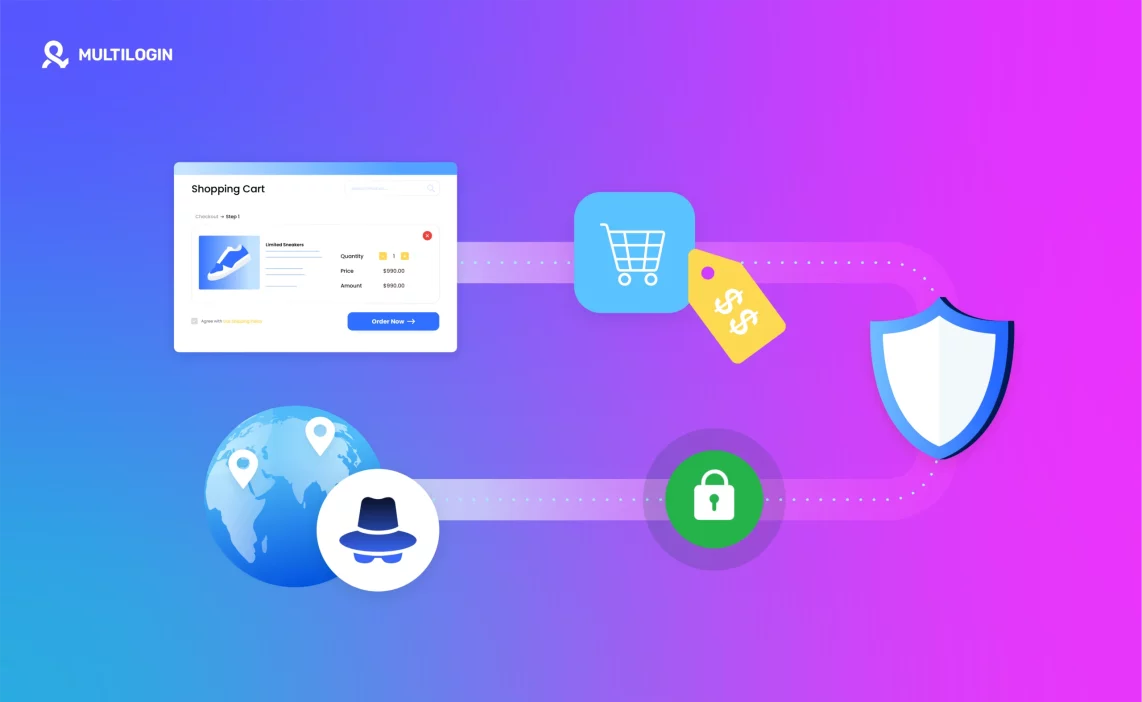Many people still think hiding their IP is enough to stay anonymous online.
But in 2026, online platforms have evolved far beyond simple IP detection. They now use powerful technologies like browser fingerprinting, behavioral tracking, and device profiling to identify who you are — even if your IP says otherwise.
That’s why the debate between using a free proxy or an antidetect browser matters more than ever. If your goal is to protect your identity, manage multiple accounts, or avoid detection while scraping data or running ads, this guide will show you exactly which option is safer and why.
What Is a Free Proxy?
A free proxy is a server that acts as an intermediary between your device and the internet. When you connect to a website through a proxy, the site sees the proxy’s IP address instead of your real one. This setup can help you bypass geo-blocks, test how content appears in different countries, or temporarily hide your location.
However, the term “free proxy” often refers to publicly available proxy servers that anyone can use. These proxies usually come with major limitations.
Most free proxies are slow, shared by hundreds or even thousands of users, and easily detected by websites. Because of their overuse and lack of encryption, they are often blacklisted by major platforms. Many free proxy providers also lack transparency about who runs the servers, which opens the door to data leaks, injected ads, and even malware.
While a free proxy may provide a quick way to change your IP, it does nothing to hide your browser fingerprint or prevent platforms from detecting suspicious patterns in your activity.
What Is an Antidetect Browser?
An antidetect browser is a privacy-focused browser built to help users mask their digital identity. Unlike regular browsers or VPNs that only change your IP address or encrypt your connection, an antidetect browser gives you full control over your browser fingerprint.
A browser fingerprint is a combination of unique data points — such as screen resolution, operating system, timezone, language, font rendering, WebGL, audio, and more — that websites use to track and identify users. Even if your IP is hidden, your browser fingerprint can betray you.
Antidetect browsers like Multilogin allow you to create multiple browser profiles, each with its own fingerprint. You can assign different timezones, languages, screen sizes, and even install cookies or extensions for each profile. These profiles are isolated from each other and behave like completely separate devices online.
When combined with a quality proxy (paid or residential), an antidetect browser becomes a powerful solution for managing multiple accounts, avoiding bans, running ad campaigns, or conducting market research undetected.
Comparing Free Proxies and Antidetect Browsers
When deciding between a free proxy and an antidetect browser, it’s important to understand what each one offers — and what it doesn’t.
A free proxy can:
- Mask your IP address
- Help you access geo-restricted content
- Hide your location temporarily
But a free proxy cannot:
- Change your browser fingerprint
- Isolate sessions between different accounts
- Prevent data leaks from browser fingerprinting
- Provide consistent speed or reliability
An antidetect browser, especially when paired with a high-quality proxy, offers a more complete privacy solution. You get control over both IP address and browser fingerprint, which is essential for advanced use cases like affiliate marketing, eCommerce automation, social media management, or data scraping.
If you only need to check a foreign website once or twice, a free proxy might suffice. But if you’re running campaigns, managing dozens of accounts, or engaging in repetitive tasks that platforms monitor closely, a free proxy won’t protect you.
Why Free Proxies Don’t Work Anymore
Using a free proxy might sound convenient, but it’s one of the fastest ways to get your accounts flagged or your data compromised.
First, most free proxy IPs are already overused. Platforms like Google, Amazon, Facebook, and TikTok constantly blacklist IPs they detect as suspicious or spammy. Since free proxies are open to anyone, their IPs quickly land on those blacklists.
Second, free proxies are often poorly maintained. They offer limited bandwidth, have unstable uptimes, and can inject ads or redirect your traffic to malicious sites. Some are even set up by hackers to capture login data or inject tracking scripts.
Third, free proxies do not encrypt your data or protect your identity beyond the IP level. Any fingerprinting technique — like canvas or WebGL detection — will still reveal who you are. Your IP might be hidden, but your device is not.
And finally, free proxies offer no session control. If you’re trying to manage multiple accounts on the same platform, your activities can be linked together through cookies, login patterns, or browser fingerprints — even with a different IP.
What Makes Antidetect Browsers Safer
Antidetect browsers offer several layers of protection that go far beyond what proxies can do alone.
- Fingerprint Spoofing: Each browser profile has its own set of fingerprint data. This includes timezone, language, WebGL hash, user agent, audio fingerprint, and more. You can randomize or customize these values to avoid detection.
- Session Isolation: Every profile in an antidetect browser is completely isolated. Cookies, cache, login credentials, and session data are stored separately. This ensures that no data leaks from one profile to another.
- Proxy Integration: Antidetect browsers allow you to assign proxies to each profile. You can use different IPs for each account, rotate them manually or automatically, and maintain sticky sessions when needed.
- Automation Compatibility: Tools like Multilogin integrate with Puppeteer and Selenium, allowing you to automate tasks while maintaining undetectable behavior. This is useful for scraping, testing, or running campaigns.
- Cloud or Local Profiles: Multilogin offers cloud-based and local profile storage. Cloud profiles are useful for team collaboration or accessing your sessions from multiple devices.
With all these features combined, antidetect browsers give you the flexibility, control, and privacy that free proxies simply cannot match.
When Should You Avoid Free Proxies?
If you’re doing anything more than casually browsing, free proxies are not a safe option.
You should avoid free proxies if:
- You manage multiple accounts on platforms like Facebook, Instagram, Reddit, eBay, or Amazon
- You run ad campaigns or affiliate tracking tools
- You scrape data from websites regularly
- You test landing pages or geo-specific ads
- You participate in crypto, NFT, or DeFi communities where reputation matters
- You access sensitive information that requires trust and privacy
In all these scenarios, using a free proxy could lead to bans, account suspensions, or worse — compromised data.
What You Should Use Instead
Instead of relying on free proxies, invest in a professional-grade privacy setup.
The ideal solution includes:
- An antidetect browser like Multilogin
- Paid residential or ISP proxies from trusted providers
- Proper session management with isolated profiles
- Secure storage of cookies and account data
- Automation compatibility if needed
Multilogin combines these features into one platform. You don’t need to patch together different tools or worry about leaks. You can manage all your browser profiles, connect high-quality proxies, and keep each identity separate.
Ready to Try the Best? No Risk, Big Upside
Why settle for half-measures or take risks with your privacy and accounts?
Frequently Asked Questions About Free Proxy vs Antidetect Browser
Yes, but it’s not recommended. Free proxies may work briefly, but they are unreliable, slow, and often blacklisted. Using a good proxy with your antidetect browser will improve stability and lower your risk of detection.
A VPN offers encrypted traffic and usually better performance than a free proxy. However, a VPN still does not spoof your fingerprint. If you’re managing multiple accounts or scraping data, you need more than a VPN.
Yes, you can use Multilogin without a proxy, but your IP address will remain unchanged. For best results, combine Multilogin with a paid residential or static proxy to control both your fingerprint and location.
They can be used for low-risk tasks like checking how a website looks in another region. But for anything involving login credentials, account management, or sensitive data — they are not safe.
Combine Proxy Power With Fingerprint Protection
If your online activities matter — and if you care about privacy, security, and success — using a free proxy in 2026 is not just risky, it’s ineffective.
Web platforms are now using powerful detection technologies that go beyond IP. They track your device, fingerprint, behavior, and session history. Masking just your IP with a free tool is like locking your front door but leaving your windows wide open.
The best way to stay safe, anonymous, and effective is to use an antidetect browser like Multilogin. It gives you full control over your digital identity — and pairs seamlessly with high-quality proxies for the complete privacy setup.



